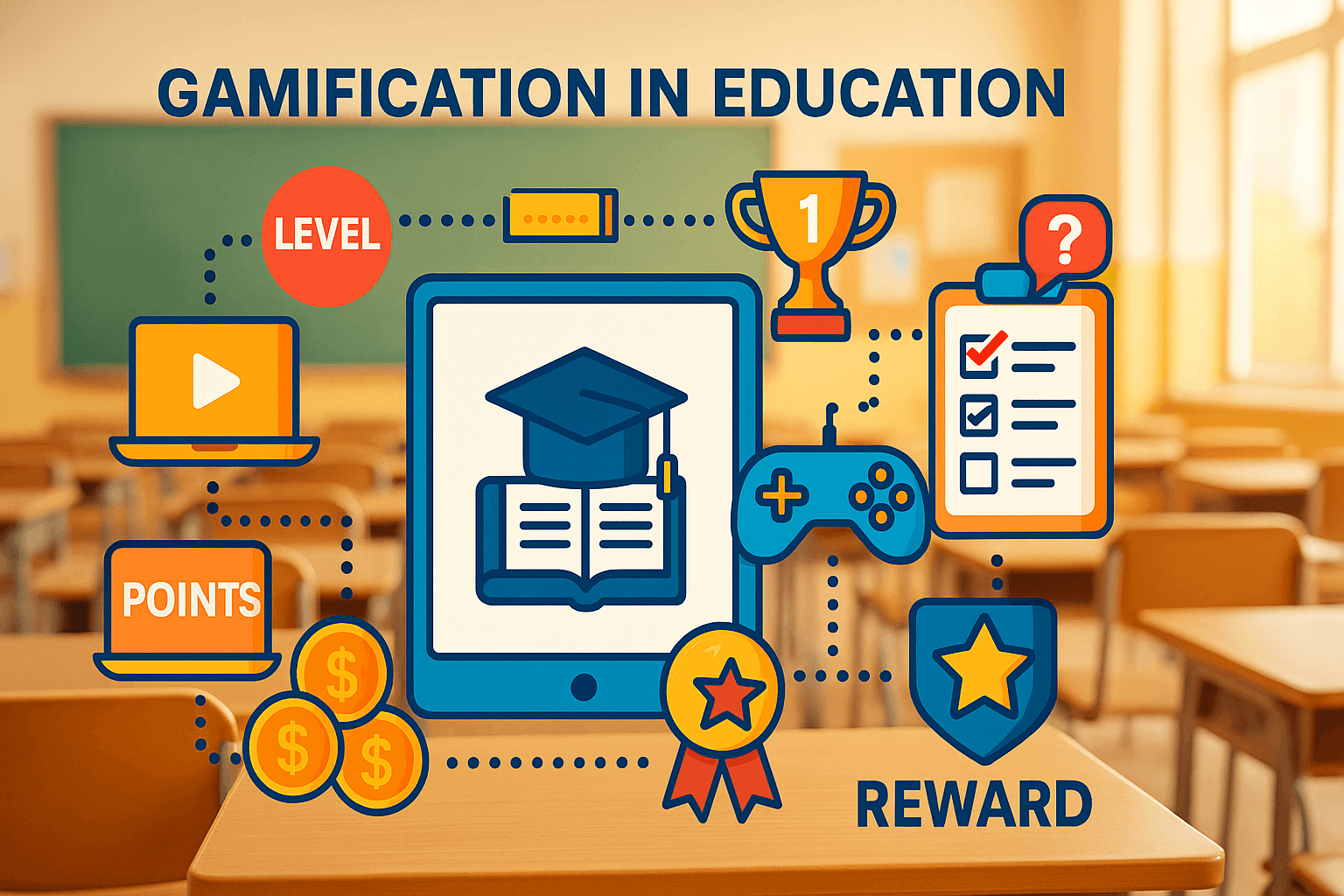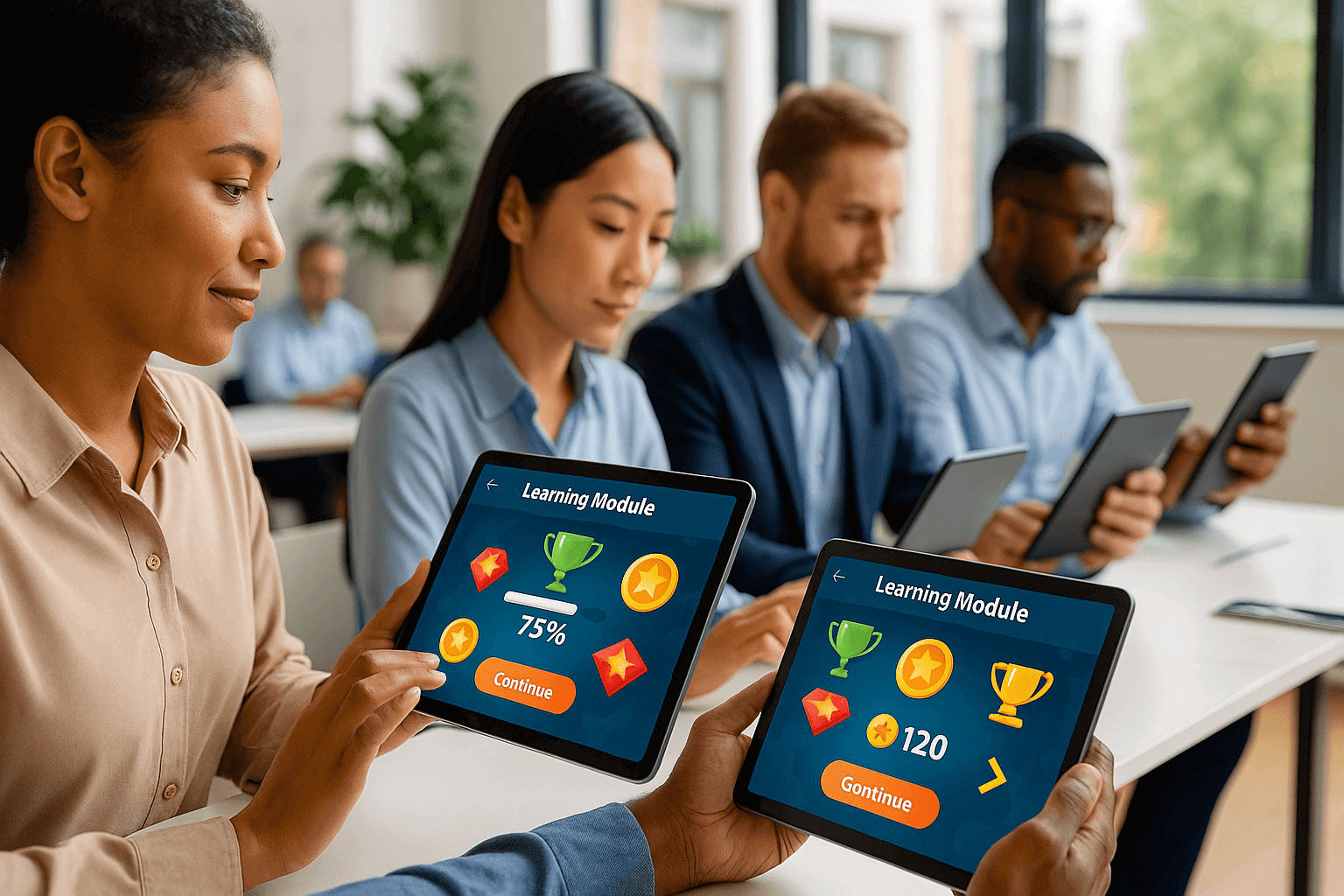Game based learning is transforming classrooms by turning traditional lessons into interactive, immersive experiences. By combining the engagement of gameplay with the rigor of academic content, educators can boost student motivation, enhance critical thinking skills, and bridge the gap between theory and real-world application.
Table of Contents
Business education has a problem: it’s still stuck in lecture and presentation mode.
Can you learn to run a startup by reading about it in a textbook? Real business problems aren’t multiple choice questions, there’s no definite answer. What might work for one company might prove disastrous for another.
You make decisions with limited information and test ideas no one’s ever tried before. And you learn the hard way what works (and what really doesn’t). There’s no slide deck to rewind or pause.
That’s why game based learning, which uses different game elements, is changing how we teach and learn business.

Game based learning blurs the line between theory and practice. It converts passive instruction into immersive, actionable knowledge. Learners are no longer attending hour-long boring lectures about leadership, negotiation, launching fictional product campaigns, managing crises or strategic thinking because they’re living in a simulated environment.
And it works: challenge-based gamification has been shown to improve student performance by up to 89.45% compared to traditional lecture-based learning activities, highlighting the many benefits of this approach.
In this post, we’ll look at five powerful examples of gamification in education and why it’s necessary for real-world skill-building.
Why game-based learning works in business education?
You help students shift from passive learning to active doing
Put yourself in the student’s shoes. How much information do you think you can absorb by listening? Forbes backs this up, immersive, game based learning approaches can increase knowledge retention by as much as 75%.
Gamification often becomes a mental model that students recall and apply later.
By understanding what is gamification and making it an integral part of your lectures, you’re building “muscle memory” for strategizing beyond the textbook. When students face dilemmas or have limited information, they think critically, adapt quickly, and take ownership of results.
You cannot teach entrepreneurial thinking from a textbook

When Elon Musk was starting SpaceX, his first three rocket launches failed. Most textbooks would call that a disaster but Musk called it a “learning curve.”
You can’t teach creativity, risk-taking, problem-solving, or resilience with a PowerPoint. Entrepreneurship is about rolling up your sleeves, testing wild ideas, failing fast, and bouncing back even smarter. Gamification software gives students a safe space to fail, reflect, and try again without facing what Musk faced.
In a simulated environment, students can launch a virtual company, overhire in the first quarter, lose cash flow, and even go bankrupt. They restart, make better choices, and grow. That loop of test, failure, and improvement builds true entrepreneurial thinking.
You engage digital-first students with interactive learning
Attention is the new currency, and today’s students are short of it. Raised on YouTube, TikTok, Instagram Reels, multiplayer modern video games, and instant everything, they expect more from learning than just listening. So, why make their learning process feel like a pause button?
By turning passive lectures into hands-on experiences, game-based learning meets students in their world, not ours. It challenges them to think fast, adapt, iterate, and engage deeply. Or, as education pioneer John Dewey put it,
“If we teach today’s students as we taught yesterday’s, we rob them of tomorrow.”
Game based learning ensures you don’t.
5 Examples of Gamification in Business Learning
Example 1# Real-time startup simulations
How much can students learn from static case studies of HBR compared to a virtual stock trading competition? You know the answer: educational games can significantly increase engagement and learning outcomes.
Learning through online business games gives students the reins of a virtual company. In real-time startup simulations, they step into the role of founder, making high-stakes decisions that affect growth, revenue, and survival.
Startup Wars turns this experience into a dynamic, data-driven simulation where students build and scale their own startups. Every decision from pricing strategies to hiring choices impacts KPIs like cash flow, churn, and product-market fit.
Student engagement is much much better in such a learning environment because they made the choices and faced the consequences. Instead of passively analyzing:
- “Why Nokia and Blackberry failed?”
- “How Apple balanced innovation and ecosystem control to maintain its premium brand and market dominance?”
- “How once an industry giant, Kodak, collapsed because they failed to evolve?
Students actively experience what it takes to build resilience, make changes under pressure, and take tough decisions like real-world founders do.
Example 2# Scenario-based roleplay
What happens when students have to pitch their startup idea, defend a $5M valuation, and convince mock investors? They stop thinking like students and start thinking like founders.
In this game based learning, students take the role of entrepreneurs, presenting to a panel of VCs or angel investors. They face questions on unit economics, pricing strategy, scalability, and market size, and learn to stay calm under pressure. It’s essentially Shark Tank but built for learning.
It’s high-pressure, high-impact learning that builds business instincts, storytelling skills, and the kind of confidence no slide deck can teach students.
Example 3# Competitive leaderboards

Managing a virtual business alone is like playing chess against yourself. The moment you’re up against other teams in a shared marketplace, the learning becomes fast-paced, strategy-packed competition.
Students follow their scores on live leaderboards in these game-based simulations. Each price adjustment, supply chain alteration or marketing action earns or loses a point. Teams evolve on the fly and continue to respond to the competitors and to the market.
The leaderboard fuels engagement and keeps students excited. It converts classroom learning into an active challenge, where smart strategy and fast critical thinking win.
Example 4# Milestone progression
In this game based learning format, students move through core business areas step-by-step. First, they complete a marketing module. Then, they take on funding. Next comes HR, operations, and beyond.
Each stage builds on the last, similar to growing a real company. You cannot run a hiring campaign before knowing your product-market fit. You cannot pitch for funding before testing your marketing.
Such sequential development helps students to be attentive and inspired. It assists them in reasoning how each choice is part of a bigger business process and drives the notion that growth occurs in phases and that you cannot do it in a short-cut process.
Example 5# Failure simulation and recovery
Failure is one of the best teachers in business. Game based learning gives students a safe space to make mistakes, analyze what went wrong, and, of course, correct them.
They might overspend, miss a key market trend, or launch the wrong product. Instead of theory, they get experience, and for grades, they receive valuable feedback.
This kind of learning stays forever and significantly increases learner engagement. It builds confidence, improves judgment, and helps students solve problems that real founders face every day.
What educators and students are saying
Game based learning is a proven strategy, and the results speak for themselves.
According to research, multi-year studies involving master’s students found that simulation-based courses boost analytical skills, enjoyment, and practical application. An experimental study with MBA professionals found that simulation-based modules significantly improved decision-making, problem solving skills, and dynamic systems thinking in real-life business scenarios.
But beyond the studies and research, the game-based learning experience has a personal impact. And, Startup Wars brings that impact to life. The platform turns passive learners into proactive decision-makers inside every classroom it touches.
Startup Wars makes business education feel real. The platform is the best among the lot because learners don’t just read about entrepreneurship, they experience:
- The tension of cash burn,
- The pressure of investor feedback,
- The complexity of real customer behavior.
Each decision carries weight, and when students are responsible for their action, engagement and learning touch the sky.
Implementing gamification is easier than you think
You don’t need to build it yourself
Custom-built simulations are great until you hit budget constraints and tech challenges. With Startup Wars, there’s no need to reinvent the wheel. You get a ready-to-run platform that drops students into realistic startup scenarios, complete with market shifts, cash crunches, and investor pressure.
All the functionalities are built-in, so you spend less time troubleshooting and more time teaching.
Built to match your course goals
Startup Wars is designed to work with your existing curriculum and meet the learning objectives. For instance, if you’re teaching unit economics or pricing strategy, students learn the hard way when their cash burn rate goes high.
If you’re covering product-market fit, the platform iterates and tests your students like real founders. Each module reinforces business theory through hands-on decision-making, turning your classroom concepts into lived experience.
Future of business education is gamified learning
You’ve seen how game-based platforms like Startup Wars bring core business lessons to life without you lecturing your way to better business learning.
Some tools keep students engaged. Others build real-world thinking. A few do both seamlessly.
The point is: not every class needs a flashy overhaul. But the right simulation tool turns passive learning into active doing. Choose based on what you teach and how your students learn best.
Get that right, and digital game-based learning will increase participation and stick with your students forever.
If you’re looking for a low-lift way to brace real-world simulations into your class, try Startup Wars today.
Bringing simulation-based learning to your classroom is easier than you think.
Frequently Asked Questions
1. ❓What is game based learning?
2. ❓What are the benefits of game-based learning?
3. ❓What is an example of a game-based approach?
4. ❓What makes Startup Wars different from other business game-based learning platforms?
5. ❓How easy is it to get started with Startup Wars in my classroom?
Ready to Try It?
Sources
- Engageli Active Learning Study (2025) – Documents 13x higher engagement in active vs passive learning
- Freeman et al. PNAS Research – Shows 6% exam improvement and 1.5x lower failure rates
- Harvard Bok Center Meta-Analysis (2025) – Proves 6x improvement in long-term retention
- EdSurge 21st Century Teaching Research (2025) – Tracks rapid growth in active learning adoption
People Also Searched For:
-
The Real Reasons Startups Fail - What 2 Startups & 70+ Startup Investments Teach You About Success
-
Most Founders Build Too Fast and That’s Why Startups Fail
-
ChatGPT 5 Release: What Educators and Students Should Know
-
Case Study in Education vs Simulation: Which Is Better for Teaching Entrepreneurship?
-
How to Use Business Simulations in the Classroom



